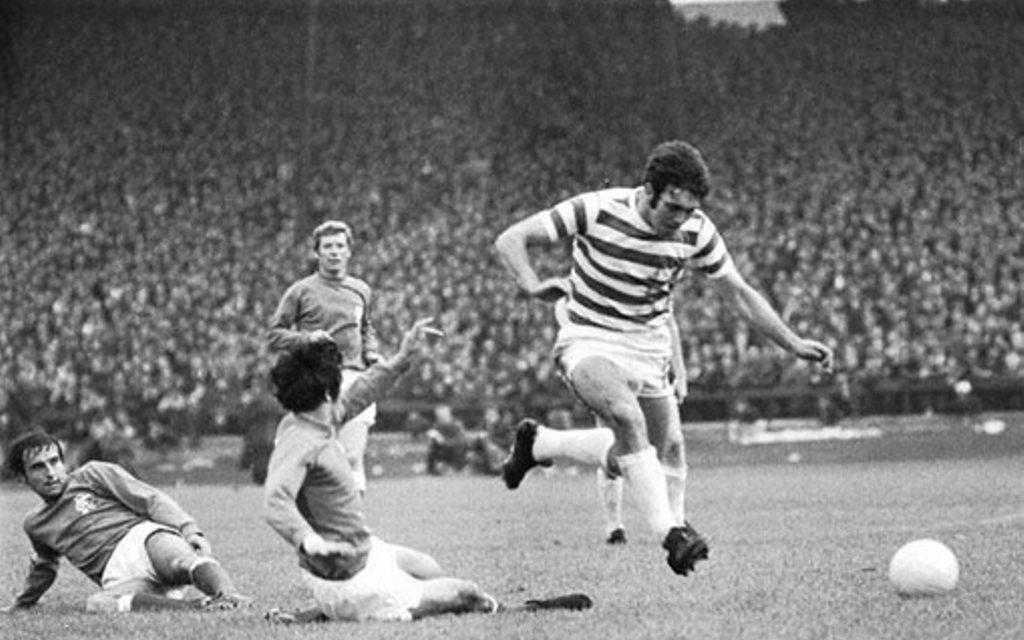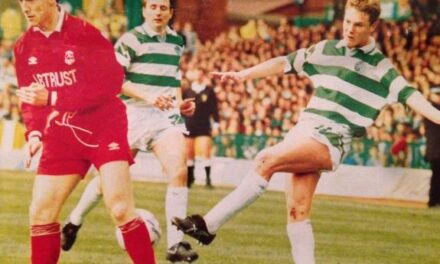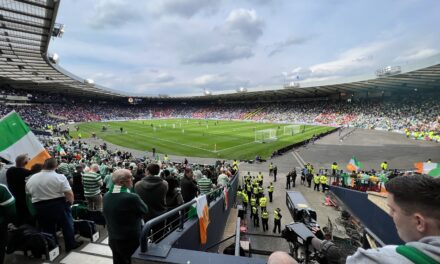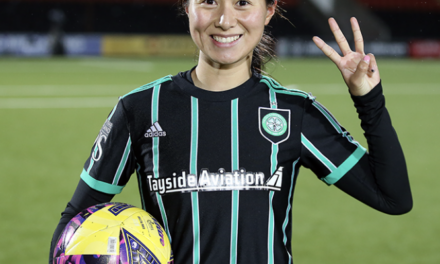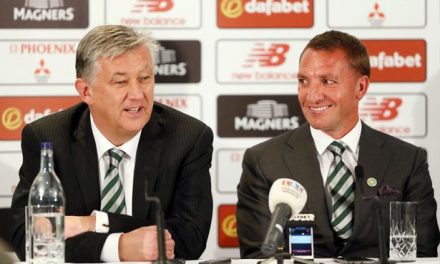John Hughes was something of a teenage sensation when he broke into the Celtic first team, aged just 17 in 1960. John was part of the ‘Kelly Kids’ crop of young players which spawned some great Celts but in those formative years at Parkhead he was to suffer some huge disappointments. The 1961 and 1963 Scottish Cup finals were lost in replays, to Dunfermline and Rangers respectively, with the Dunfermline defeat particularly hard to suffer given that Celtic were denied by a heroic performance from the Pars’ keeper, Eddie Connachan.
By the mid 1960’s desperation was setting in amongst the Celtic support and much flak was aimed at a team, who in the main, were still only youngsters and mainly lacking in guidance. The 1964 European Cup Winners’ Cup semi-final was lost in spectacular fashion after Celtic threw a 3-0 lead away in the second leg in Hungary against MTK Budapest, although even during these difficult times John was a guiding light in Celtic’s darkness. In September 1964, on a day of atrocious weather, he was the inspiration in, what was back then, a very rare Celtic triumph over Rangers. In January 1965 big John then became something of a Celtic legend, when he turned out in what he later called ‘a pair of sannies’ on an icy Parkhead pitch and ran riot, scoring five, in an unforgettable 8-0 win. This was something which Celtic fans of that period loved to discuss in the many years that followed.
Scottish football changed totally when Jock Stein returned to Parkhead as Celtic manager in March 1965. John was named as centre forward when Celtic won the Scottish Cup in April 1965, in dramatic fashion, their first trophy since 1957. Many people think that was Celtic’s turning point on the road to success but that truly came in the 1965 League Cup final in October. John, now fielded at outside left, scored twice from the penalty spot in the 2-1 over Rangers, showing remarkable coolness in doing so. This was the first time Celtic had beaten Rangers in a crucial match since the 7-1 League Cup final win in 1957 and Celtic’s fortunes had now changed utterly. This truly was a sign that the Celtic tide had finally turned.
Celtic’s success carried on under Stein with John Hughes very much to the fore. In 1967 the Celts reached the European Cup final, although there was disappointment for John that he missed the final through injury. Fate was particularly unkind as the big man had played in five of the eight games to get to the final and would likely to have been a certain starter had he been fit for that final in Lisbon against Inter Milan.
John was capable of being effective in any forward position and Stein was to put this versatility to good use. Stein was also a believer in ‘horses for courses’ with Bobby Lennox being preferred on hard, dry ground, with John viewed as being the more reliable on heavy pitches, in which his strong running and powerful shooting was could be a great asset.
In the 1970 European Cup semi-final John had an inspirational game against Leeds United’s England centre half, Jack Charlton. John, playing in a modern striker’s role, scored the equaliser from a header as Celtic won 2-1 in front of an incredible record European crowd of 136,000. That Leeds semi was to be Celtic’s pinnacle as they lost the final to Feyenoord by 2-1 in Milan, just a few weeks later. Apart from goalkeeper Evan Williams, no Celtic player played well, and in later years John thought it very unfair that he appeared to carry the can for a chance he missed at the beginning of extra time.
I was fortunate enough to interview John at his home in Baillieston a few years ago and he was still very bitter about the nature of his departure from Celtic in October 1971. John was Celtic through and through and was sold against his wishes when he was still only 29 and had a lot left to offer. It was a sad end to a 12 year career which saw him score 189 goals in 416 games and win 17 major trophies in the process. He also described the difficult relationship he had with Jock Stein, stating that Jock, like many managers of that period, could have a cruel streak in them.
Older Celtic fans still wax lyrical about some of John Hughes’ goals. In 1964, against Morton at Cappielow, on a mud bath pitch, he scored a spectacular goal from 35 yards and in 1965, at Dens Park, he perhaps surpassed that with an outstanding run and shot from 30 yards which flew past the Dundee goalkeeper. Celtic fans of my father’s generation would talk endlessly of John’s powerful running and shooting.
John became renowned during his Celtic years for the nickname, ‘Yogi Bear’, a term which was used for the rest of his days. There are a few stories of how he came by that particular moniker and it was to stick with him for the rest of his days. He was much loved by the supporters who would sing in their thousands ‘Feed the Bear, feed the Bear, feed the Bear’ in an effort to get the big man on the ball. There was also a lesser known chant to the tune of Glory, Glory, Halleluiah.
Yogi Bear he plays for Celtic
Yogi Bear he plays for Celtic
Yogi Bear he plays for Celtic
Cause he’s smarter than the average Gers
In later years a Celtic fan told me a story about ‘Big Yogi’ which is worth recalling This person was a teenager in a Catholic seminary in Coatbridge, very near to the public house which John Hughes ran at that time, in 1970. There was an old Italian priest in the seminary, and when Celtic drew Fiorentina in the European Cup quarter finals, the priest was very keen to go but had no way of getting a ticket. One of the boys wrote a letter to John and put it through the pub door, asking for two tickets, and saying they would pay in return by postal order. A few days later a letter arrived at seminary addressed to the Italian priest. It was from John Hughes, with two tickets enclosed, stating that no payment was necessary but just to ‘say a prayer for my family.’ The boy and the old priest viewed a 3-0 Celtic win in front of 77,000 fans on a never to be forgotten night for both.
John Hughes passed away last weekend and his family say he was still watching Celtic to the very last, on television, in the 2-0 win over Aberdeen. A Celtic man to the last. As fans, we should mourn Yogi’s passing, and the other Lisbon Lions who have gone, because not only will we not see their likes as a team again, we will not see their likes again as men.
Rest in peace Yogi, you gave so much to so many, and for that you will never be forgotten.

